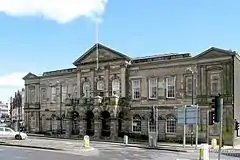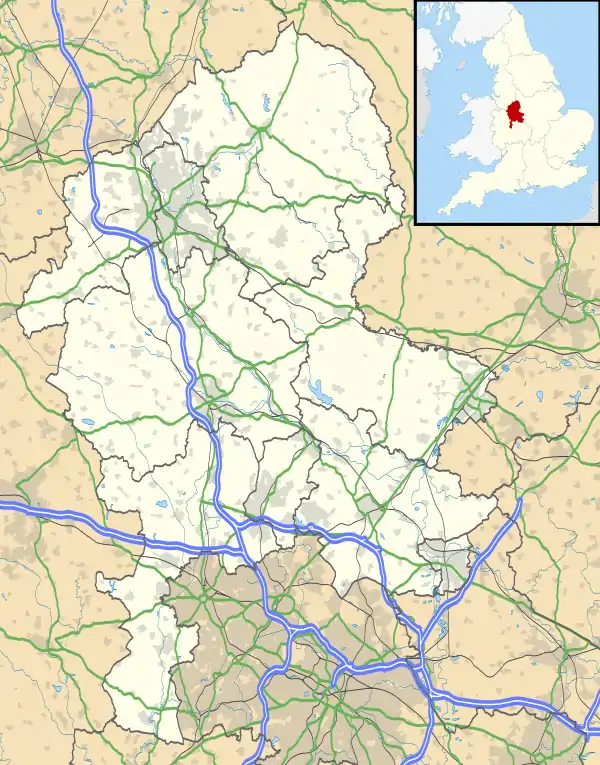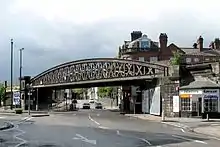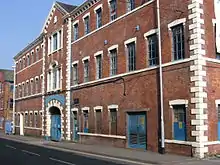Longton, Staffordshire
Longton is one of the six towns which amalgamated to form the county borough of Stoke-on-Trent in 1910, along with Hanley, Tunstall, Fenton, Burslem and Stoke-upon-Trent.
| Longton | |
|---|---|
 Longton Town Hall | |
 Longton Location within Staffordshire | |
| Population | 27,214 |
| OS grid reference | SJ911433 |
| Unitary authority | |
| Ceremonial county | |
| Region | |
| Country | England |
| Sovereign state | United Kingdom |
| Post town | STOKE-ON-TRENT |
| Postcode district | ST3 |
| Dialling code | 01782 |
| Police | Staffordshire |
| Fire | Staffordshire |
| Ambulance | West Midlands |
| UK Parliament | |
History


Longton ('long village') was a market town in the parish of Stoke in the county of Staffordshire. The town still has a market housed in an attractively renovated market hall.
Coal miners in the Hanley and Longton area ignited the 1842 general strike and associated Pottery Riots.
In March 1865, Longton and Lane End were incorporated as the Borough of Longton. On 1 April 1910, the town was federated into the county borough of Stoke-on-Trent.
Together with Rochdale, then in Lancashire, Longton was host to the first Workers Educational Association tutorial classes. R. H. Tawney, known as "the patron saint of adult education",[1] taught the classes for three years starting in January 1908.
For a time, until he moved to Manchester in 1909, Tawney was working as part-time economics lecturer at Glasgow University. To fulfil his teaching commitments to the WEA, he travelled first to Longton for the evening class every Friday, before travelling north to Rochdale for the Saturday afternoon class.
Arnold Bennett referred to Longton as Longshaw in his novels centred on the Potteries towns.
Landmarks
Longton Town Hall, which was completed in 1844 and was the local seat of government until 1910, was being stripped out by contractors when it was saved from demolition in 1986.[2]
Industry
The district has a long history as a base for the pottery industry, such as Paragon China and Aynsley, and several major manufacturers still have a presence, along with Gladstone Pottery Museum. Roslyn Works, which adjoins the latter, is now home to several small-scale manufacturers of ceramics.
Transport
In 1997 the one-way system was finally bypassed when a new section of the A50 was opened, running past the town in a cutting. The one way system remains, but is no longer the main route into the main town centre of Hanley.
Longton is served by a railway station which was opened by the North Staffordshire Railway on 7 August 1848. A new bus interchange was opened adjacent to it in 2003 on the site of a former Co-op supermarket.

Education
Secondary schools in the area include St Thomas More Catholic Academy and Stoke Studio College.
Retail
A new shopping precinct, the Bennett Precinct, opened in 1962.[3] It is now named Longton Exchange.
In 2003 a large Tesco Extra superstore was built.. Since then, other major retailers such as Argos, Next, Pizza Hut, Matalan, Wilko and B & M have opened new premises.
Building firm St. Modwen's opened an £8 million retail complex in April 2012. The stores there include McDonald's, Pets at Home, Smyths and Currys.
Other local businesses like Hylands and Bevans have also thrived in the area.
Nightlife
Jollees Cabaret Club was a very popular nightspot in the 1970s, attracting some of the biggest names in entertainment. In the early 1990s, Shelley's Laserdome became widely known throughout the Midlands as a rave venue, but it was forced to close in 1992.
Notable people
- Sir John Edensor Heathcote (c.1757–1822) Stoke-on-Trent industrialist, owner of Longton Hall, which he rebuilt in 1778.
- John Aynsley (1823–1907) English potter who established the Portland Works in Longton.
- William (Billy) Weston (1847-1935) Australasian billiardist, emigrated from Longton aged 3.
- Percy Shelley (1860-1937) was a major force in developing Shelley Potteries, born in Longton.
- Frederick Arthur Challinor (1866–1952), was a British composer.
- George Arthur Gallimore (1886–1949) English professional footballer who made 77 appearances for Stoke City F.C.
- Henry "Harry" Colclough (1888–1955) English international footballer, who made 83 appearances for Crystal Palace F.C.
- Louis Williams (born 1889 - date of death unknown) English footballer made 153 appearances, including for Port Vale and Stoke
- Ernest Albert Egerton VC (1897–1966) English recipient of the Victoria Cross
- William Thomas Astbury FRS (1898–1961) English physicist and molecular biologist who made pioneering X-ray diffraction studies of biological molecules.
- William Wootton (1904–2000) English footballer, made 56 appearances for Port Vale F.C.
- Gordon Mons Higginson (1918-1993) British purported spiritualist medium.
- Norman Henry Hallam (1920–1997) was an English footballer, made 63 appearances for Port Vale F.C.
- Charles Tomlinson (1927–2015) English poet, attended Longton High School
- Freddie Jones (1927–2019) actor; his many roles on film and television included Sandy Thomas in Emmerdale.
- Andrew Evans (born 1950s) a soldier from Longton, stationed at Whittington Barracks, was wrongfully convicted and served 25 years in custody after confessing to the 1972 murder of Judith Roberts, a 14-year-old schoolgirl from Tamworth.
- Philip Adrian "Phil" Heath (born 1964) former professional English footballer, made 297 appearances.
Trivia
- Longton is the birthplace and home of Alan Povey's character Owd Grandad Piggott
- Black Country folk singer/songwriter, Neil Morris, now lives near Longton
Gallery
 Sutherland Institute, Longton. Completed in 1898 on land donated by the Duke of Sutherland who lived at nearby Trentham Hall.
Sutherland Institute, Longton. Completed in 1898 on land donated by the Duke of Sutherland who lived at nearby Trentham Hall. Panel above entrance to Sutherland Institute
Panel above entrance to Sutherland Institute
References
- Elsey, B. (1987) ‘R. H. Tawney – Patron saint of adult education’, in P. Jarvis (ed.) "Twentieth Century Thinkers in Adult Education", Beckenham: Croom Helm
- "From Sentinel legend John Abberley's archive we look at Longton's Town Hall". Stoke Sentinel. 30 October 2018. Retrieved 20 January 2021.
- Abberley, John (2003). The Way We Were in the 1960s: Memories of Staffordshire in Photographs. Altrincham: Hochland Communications Ltd. ISBN 1-904038-07-7.
External links
- Make it Stoke-on-Trent - Longton Regeneration (listings of local amenities and regeneration projects)
- Longton - Stoke-on-Trent
- Longton
- Gladstone Pottery Museum
- Use interactive maps to find historic photographs and artefacts of old Longton
- Town profile at The Sentinel (local newspaper)
- Longton South Community Blog (local blog)
- www.hylands.tv